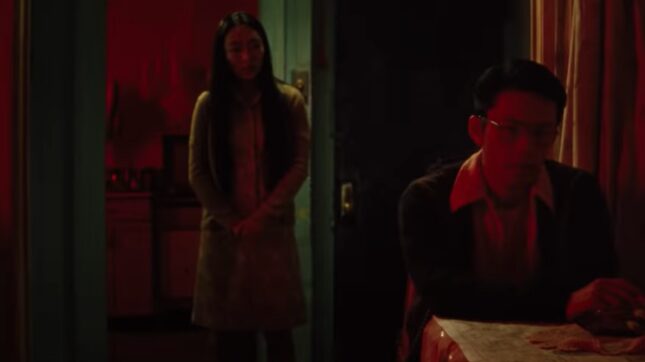

Because the immigrant experience is either rarely or misrepresented on screen, there’s a seemingly unspoken obligation to respond positively to these stories, regardless of quality. The guilt, for me, is born out of a sense of betrayal; as if denigrating a story that’s underrepresented might stifle the ones that are actually worthwhile. Maybe the fact that this feeling even exists in the first place is a sign that the larger goal of diverse depictions is closer to being achieved, and that all immigrant stories need not be held to a dubious metric. Thinking constantly about representation is, frankly, exhausting, and considering every piece of art made by a writer or filmmaker from a minority community through that lens diminishes the work itself.
Tigertail, Alan Yang’s directorial debut, is the result of four years’ time spent whittling down a 250-page script into a spare, quiet, hour-and-a-half drama that is loosely autobiographical, based on Yang’s father’s personal story of immigrating to America and the life and love he left behind in Taiwan. In part, it’s a love letter to Yang’s father’s story, which the director touched on in an episode of Master of None, the Aziz Ansari Netflix vehicle that aired in 2015, but it is also yet another entry in the canon of immigrant parent stories (The Farewell and The Joy Luck Club come to mind), in which the first generation grapples with the unseen baggage of their parents’ struggles.
Spoilers ahead.
In 1950s Taiwan, a young Pin-Jui (Tzi Mah) runs through an expansive rice field, under the eye of his grandmother in Chinese-occupied Taiwan at the opening of the film. Eventually, he is reunited with his mother and goes to work alongside her in a sugar factory. Yuan (Joan Chen), a childhood friend Pin-Jui meets early on, is his first love, but their relationship grows into something more. Pin-Jui’s bond with Yuan is foregone in favor of his arranged marriage with Zhenzhen, the daughter of his mother’s boss at the sugar factory. Though neither of them appears to care for each other, they make it out of Taiwan and to America, where the scenes of their life together are played out in flashbacks that contrast with the present day.
Pin-Jui’s bitterness from leaving behind a life that he wanted for a life that he felt he should have has seemingly been passed down to his adult daughter, Angela (Christine Ko), who struggles with her own love life and is incapable of communicating with her father, whose own reticence is born of a long and lingering heartbreak that has stretched out over decades. In the present day, Pin-Jui is now a shell of a man who is in constant mourning for the life that he left behind—a common thread that runs through other immigrant narratives like The Namesake or Vida. The struggle that the first generation born in America never quite understands or experiences is supposedly what drives the conflict between the two main characters, but there’s not enough time dedicated to Angela’s character to make it feel anything other than one-sided.
The sacrifices Pin-Jui makes for a better life are the sort that children of immigrants are supposed to acknowledge and feel with every step they take that is outside of their parent’s limited experience—as if every step is not just a step for ourselves, but for the larger collective, prioritizing family over the individual. Truthfully, Tigertail is Pin-Jui’s story through and through, and the film would’ve benefitted from tightening its focus. It’s not that Angela’s portion of the story isn’t important, but without knowing enough about Angela herself, it’s hard to find empathy, which is precisely what an immigrant narrative of this sort needs to succeed. No one story is universal, but being able to tease out truths that gesture towards a shared experience with nuance makes these films feel personal.The strongest part of Tigertail comes at the end of the movie when Pin-Jui brings Angela and shows her what remains of his past—the rice paddy is still there, the sugar factory still stands, but the house that he grew up in is a shell of its former self, abandoned, and left to return to nature. It’s difficult to understand the specifics of your parent’s life and how those incidents shaped them and their behavior unless you can actually see it with your own eyes, so a trip to the old country usually helps, a last-ditch effort to make the mythology of the immigrant origin-story real.
Tigertail is currently streaming on Netflix.